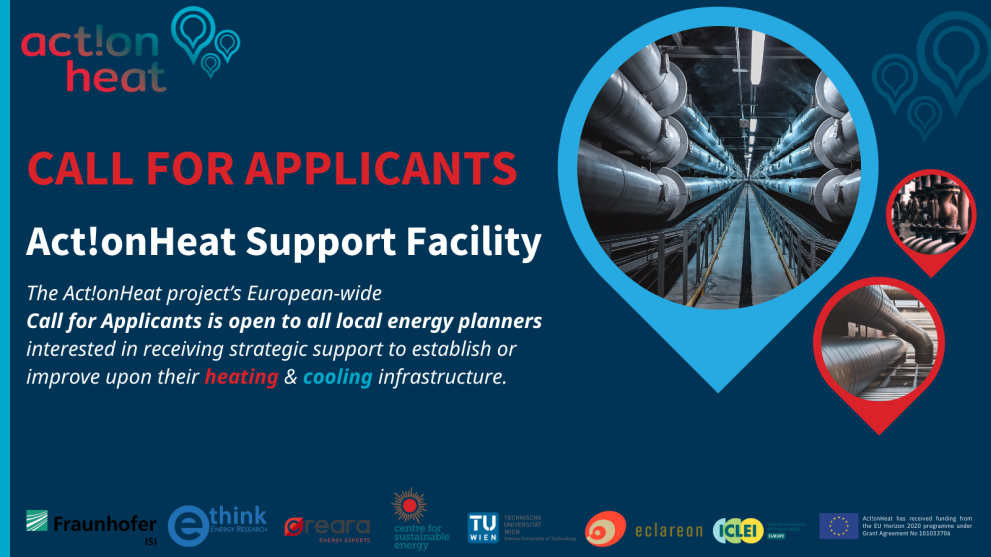
The transition toward more affordable, secure and sustainable energy is a priority for city planners in actioning strategic heating and cooling (H&C) planning and decision-making. The European-wide Act!onHeat Support Facility, of which ICLEI is a partner, is available to all local energy planners to accelerate this energy transition to a more sustainable future for local communities. Energy planners are provided with know-how, resources and experience, as well as exclusive access to and insight on tools tailored to their needs, in order to help facilitate municipalities to start, complete, or improve upon their strategic H&C planning.
Since its launch in March 2022, the Support Facility has been actively guiding energy planners from municipalities across Europe. Examples of support services include: providing municipalities with educational materials and methodologies on heat planning, such as the development of a methodology to identify the least cost building renovation measures and the delivery of heat demand and gross floor area density maps.
Get a glimpse of some of the supported cases below:
Zelzate, Belgium
Experts in Zelzate explored the viability of extending the existing heat network proposals involving ArcelorMittal steelworks and Sint-Jan Baptist Psychiatric Centre, with a view to including a link to Zelzate Centre in the first instance, and potentially to Sas van Gent as an extension of the project. A second potential heat source from the Cargill starch production plant was also considered. The emergence of the modelling of five scenarios using THERMOS resulted in a number of viable optimised networks.
Sint Niklaas, Belgium
The local government of Sint Niklaas and VITO, a technological research organisation, received training on THERMOS and worked together to start a heat network in the local area. What resulted was the successful modelling of two financially viable scenarios incorporating waste water treatment works and a future solar thermal site with heat storage.
Vorarlberg, Austria
Energy agency Energieinstitut Vorarlberg explored the feasibility of establishing a heat network in a social housing development in the town of Bludenz, Austria. The modelling of six scenarios using THERMOS emerged from this project, resulting in optimised networks, including supply model optimisation. Notably, the setting up of a heat supply of the social housing estate via a district heat network has been deemed feasible, even with a deep level of building retrofit.
LEA-Hessen
State energy agency LEA-Hessen benefitted from comprehensive workshops, targeted training webinars and the creation of a best practice body of material alongside consulting in this project. This provision has resulted in: the introduction of mandatory heat planning in Hessen; the setting up of implementation requirements being formulated in an associated ordinance; a permanent, regionally anchored service to provide effective advice to local authorities, in the form of regular consultation hours, a heat atlas and a point person responsible for this topic, amongst other features.
MANU (North Macedonia)
The Macedonian Academy of Sciences and Arts (MANU), an independent academic institution that provides support to municipalities on energy planning, plans to prepare a nationwide heat demand density map as well to identify potential district heating maps, with a view to transforming the heating and cooling planning of multiple municipalities. This project is still in its infancy, but if successfully executed, may be replicated in other countries in the region.
As more energy planners develop best practice policies through the use of open source analysis tools and as a result of knowledge sharing and upskilling through the Act!onheat Support Facility, more European municipalities are transitioning towards a more sustainable future in the field of heating and cooling planning.
Interested in how the Support Facility can benefit your local community? The Call for Application is now open!
New applicants will be selected based on their ambition, interest, and needs. Once the relationship is established, clustered and individual advice will be given on planning, pre-feasibility, and finance. Specifically, applicants will gain exclusive access and insight to the H&C planning software Hotmaps and THERMOS, which can be used for their local energy transition.
Additionally, to meet the specific needs of the locality, applicants are able to select between different Support Facility modules to participate in: 'H&C transition strategy development', 'Project Feasibility', and ‘Financial Studies’.
APPLY HERE
Details
- Publication date
- 27 February 2024
- Author
- European Climate, Infrastructure and Environment Executive Agency
